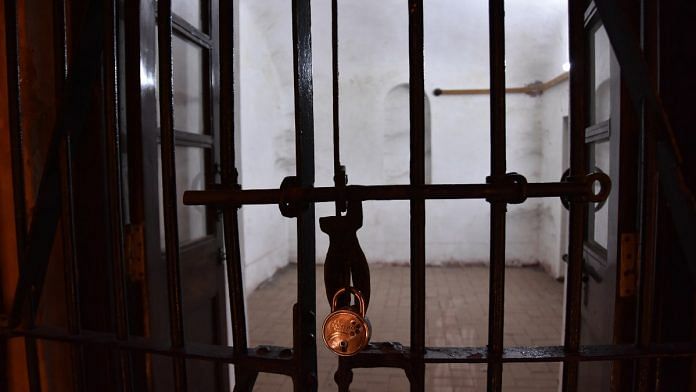New Delhi: A high-powered committee formed to look into ways to decongest the prisons of Delhi to contain the spread of Covid-19 decided Monday undertrials accused of murder can also now be considered for grant of interim bail for 45 days.
The committee set up on the directions of the Supreme Court, however, said these undertrials should not be involved in any other case and have spent more than two years in jail. Their bail should be considered preferably on personal bond, it said.
Also allowed to be considered for interim bail are undertrials accused of culpable homicide who have spent more than a year in jail, prisoners accused of attempt to murder who have spent more than six months behind the bars, and theft accused who have spent more than 15 days in jail.
The committee has allowed male undertrial prisoners over 65 years of age and female undertrials over 60 years of age, who have spent at least six months in jail, to be considered for release on interim bail as well.
The application for interim bail of these undertrials also needs to be accompanied by a “good conduct” certificate from the jail superintendent concerned.
The committee, however, excluded certain categories of undertrials from being considered for release. These include prisoners charged with rape or certain offences of the Narcotic Drugs and Psychotropic Substances Act, the Protection of Children from Sexual Offences Act, the Prevention of Corruption Act, the Prevention of Money Laundering Act, and the Maharashtra Control of Organised Crime Act.
It also excluded foreign nationals and those involved with cases being investigated by CBI, ED, NIA, special cell of the Delhi Police, crime branch, Serious Fraud Investigation Office, terror-related cases, riots cases, and cases under the Unlawful Activities (Prevention) Act.
The committee noted that the new criteria would benefit 1,500 to 1,700 undertrial prisoners.
Also read:Fans, mosquito nets, pool testing — the plan to get Delhi courts working after lockdown
Decision after Rohini jail inmates, staff test positive
The committee set up by Delhi government comprises Delhi State Legal Services Authority Executive Chairperson Justice Hima Kohli, the Principal Secretary (Home) and the Director General of Police (Prisons).
It was set up in the light of an order passed by the Supreme Court on 23 March, when a three-judge bench directed all states and union territories to set up high-level committees to determine the categories of prisoners who could be released on parole for four to six weeks. The move aimed to decongest prisons to contain the spread of Covid-19.
The Delhi committee had on 28 March relaxed the interim bail criteria for prisoners facing trial in a case that prescribes a maximum sentence of seven years or less. So far, over 3,000 inmates have been released on the basis of the committee’s suggestions.
The decision to further relax the criteria was taken Monday after the court was informed by the Delhi State Legal Services Authority that 16 prisoners and one jail staff from the Rohini jail have so far been found Covid-19 positive. The DGP (Prisons) had written to the committee demanding that Delhi jails be decongested further.
Advocate Ajay Verma, convenor of the National Forum for Prison Reforms, lauded the move and said the Delhi high-powered committee “is setting an example for other states”.
“This new criteria of interim release of UTPs (undertrial prisoners) will further reduce prison population which is still overcrowded. This criteria will endorse the popular saying ‘bail is rule and jail is exception’,” he told ThePrint.
“Due to the stoppage of mulakat, lots of prisoners were under stress but this will help many jail inmates to unite with their families during this pandemic. Other states in India are also required to follow similar steps such as grant of emergency paroles, special Remissions to convicts and interim bails to under trial prisoners,” he added.
Also read:Delhi HC says can challenge extended Covid quarantine, but asks people not to rush to courts



